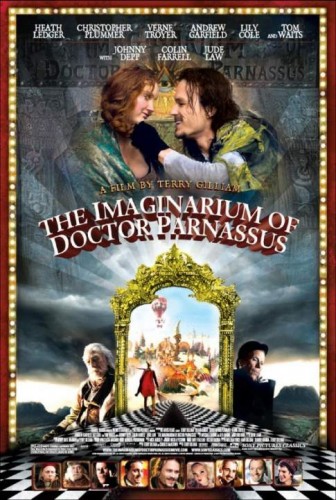 It’s a risky move driving sixty miles to see a movie you have been anticipating for over a year. It very quickly puts the movie into a rarified air, and you view it under a different kind of microscope because of the distance you traveled to view it. This was exactly my situation with The Imaginarium of Dr. Parnassus. Some might not recognize the film by it’s title, but it is the film that has the dubious distinction of being the final film of Heath Ledger.
It’s a risky move driving sixty miles to see a movie you have been anticipating for over a year. It very quickly puts the movie into a rarified air, and you view it under a different kind of microscope because of the distance you traveled to view it. This was exactly my situation with The Imaginarium of Dr. Parnassus. Some might not recognize the film by it’s title, but it is the film that has the dubious distinction of being the final film of Heath Ledger.
The film focuses on a traveling London stage show of the same name, one that looks for people to throw away their inhibitions and prior machinations about what the show appears to be (another cheap, dirty nickel show), and to free their minds to their imaginations. Dr. Parnassus (Christopher Plummer) and his band of misfits, including his daughter Valentina and a brash little person Percy (Verne Troyer).
One night after a particularly rough outing, the group is crossing a bridge when a flash of lightning allows them to see the silhouette of a man hanging under the bridge. After a rescue operation, we are now introduced to Tony (Ledger), and the rest of the film follows his impact on the traveling show, as well as the on-going gambles between Dr. Parnassus and Mr. Nick/The Devil, played fantastically by Tom Waits.
If the film seems complex, believe me, it is. And for a director as hit or miss as Terry Gilliam, some might expect the movie to flounder or completely fall flat on its face. But it doesn’t. It never does. What Gilliam presents us with is an environment that shows us conflict between an old culture and the new world, but also presents us with the fantastical world behind the mirror known as the Imaginarium.
The major struggle between the film as I alluded to earlier seems to be the struggle between the old culture and the new world. This movie, though as we follow the group around appears to take place in Ye Olde London, but it’s actually modern London, and the dynamic between the cast of the Imaginarium and their sought after audience seems tense and palpable at most moments. The audience is rarely ready to embrace what they are doing. That is, until Tony gets involved.
Heath Ledger’s final performance is strong, and there is something about Tony that is truly mysterious. On one hand, he seems charming, likable, fun… but on the other he seems to be hiding a major secret and could potentially be a swindler. What Ledger does marvelously is toe the line with such ease that you almost instinctively decide that Tony is a good guy, and those pursuing him are the bad guys.
Now, the major gimmick of the film is that the script had to be rewritten after Ledger’s death, so that each time Tony enters the Imaginarium we get a different A-List star to portray him. First, we get the always dynamic Johnny Depp, who here provides us with some laughs. Depp’s Tony is important because it’s before we have started to piece together Tony’s sordid past. Second, we get Jude Law, and this is when Tony’s true colors begin to seep through the screen. He seems desperate for escape, but he’s trapped within himself. Our final Tony is played brilliantly by Colin Farrell, who takes Tony through his final development into how we finally see him.
The performances throughout the film are quite strong, but the major star here are the visuals. Think Big Fish meets Pan’s Labyrinth. I myself didn’t notice the striking resemblance to the latter until my little sister Kristina mentioned it, but it’s quite the daft observation. On one hand, we have the droll, dreary streets of London, and on the other we get the vibrant, vivid, Candyland colored Imaginarium. The struggle between the two worlds keeps the movie fresh.
Overall, the movie was definitely worth the trip.
Final Words:
The Imaginarium of Dr. Parnassus is an easy movie to recommend, but I doubt everyone will enjoy it as much as I did. The film boasts fantastic visual effects, strong performances, and the story is unique and fun, while also being mysterious and cerebral at the same time. I will always wonder what the film would’ve ended up like had Ledger been able to finish it, and I wonder how much the script was changed so that it could still be produced. The three actors who stepped up to fill Ledger’s absence all offer something different, and they all do very well in limited roles. Tom Waits sizzles as Mr. Nick, Christopher Plummer subtley engages with Dr. Parnassus, and Terry Gilliam proves that his imagination is still as sharp as ever.
Final Score: 8.9/10
